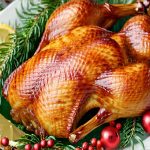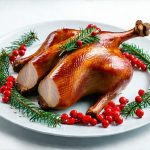The holiday season is often synonymous with joyful gatherings, festive feasts, and cherished traditions. However, for those living with Gastroesophageal Reflux Disease (GERD), this time of year can present unique challenges. The abundance of rich, potentially triggering foods combined with altered schedules and increased stress levels can easily exacerbate symptoms like heartburn, acid reflux, and indigestion. Navigating the holidays while prioritizing digestive health requires a proactive approach – one that doesn’t necessitate sacrificing all enjoyment but rather focuses on mindful choices and strategic planning. It’s about adapting traditions, not eliminating them, to ensure a comfortable and happy season.
Many individuals find themselves facing heightened GERD symptoms during the holiday period due to several converging factors. Dietary indiscretions are common; tempting treats and indulgent meals often take precedence over careful eating habits. Beyond food, stress – inherent in travel, shopping, and social obligations – can significantly impact digestive function. Changes to routine also play a role. Regular meal times, exercise schedules, and sleep patterns are frequently disrupted, all of which can contribute to increased acid production and reflux episodes. Understanding these contributing factors is the first step towards mitigating their effects and enjoying the holidays without discomfort. Perhaps establishing a morning routine could help maintain some consistency during this hectic time.
Dietary Navigation During Festive Feasts
The cornerstone of GERD management during the holidays lies in mindful eating and making informed food choices. While complete restriction isn’t necessary (or desirable!), being aware of common trigger foods is crucial. – Chocolate, caffeine, alcohol, fatty or fried foods, peppermint, spicy dishes, citrus fruits, and tomatoes are all well-known culprits for many individuals with GERD. It’s important to identify your personal triggers as sensitivities vary widely. Pre-planning what you’ll eat and having a strategy for navigating buffet-style gatherings can make a significant difference. Don’t arrive hungry! Having a small, GERD-friendly snack beforehand will help you avoid overeating at the event. If you are planning a trip, consider building a travel kit to ensure you have your necessities on hand.
Portion control is equally important. Even seemingly harmless foods can cause issues when consumed in excessive amounts. Focusing on smaller portions allows you to savor flavors without overwhelming your digestive system. Consider using a smaller plate if available. When faced with numerous tempting options, prioritize those that are less likely to trigger symptoms. Lean proteins, whole grains, and non-citrus fruits and vegetables are generally good choices. Remember, it’s okay to politely decline offerings or ask about ingredients if you’re unsure.
Finally, pay attention to how you eat. Eating quickly and without chewing thoroughly can increase the risk of reflux. Take your time, savor each bite, and focus on mindful eating practices. Avoid lying down immediately after meals; allow at least 2-3 hours for digestion before reclining. Staying upright helps gravity work in your favor, reducing the likelihood of acid creeping up into the esophagus. Hydration is also key – water can help dilute stomach acid and promote proper digestion. Thinking about what you eat might also mean considering comfort foods that are less likely to cause issues.
Smart Swaps & Recipe Modifications
Adapting traditional holiday recipes to be more GERD-friendly is a fantastic way to enjoy familiar flavors without compromising your health. Simple swaps can make all the difference. For example, using lean ground turkey instead of beef in meatloaf or chili significantly reduces fat content. Substituting whole wheat flour for white flour adds fiber and improves digestion. Utilizing herbs and spices instead of excessive butter or cream provides flavor without triggering symptoms.
- Consider baking instead of frying to reduce fat intake.
- Use low-fat dairy alternatives, like almond milk or soy milk.
- Limit the use of acidic ingredients such as tomatoes in sauces or marinades.
- Opt for smaller portions of desserts and choose options with less sugar and chocolate.
Many delicious recipes can be modified without losing their festive appeal. Online resources offer a wealth of GERD-friendly holiday recipe ideas, allowing you to create a menu that caters to both your taste buds and your digestive health. Don’t be afraid to experiment and find what works best for you! Sharing these modifications with hosts or family members who are preparing food can also ensure there are options available that you can comfortably enjoy. Understanding how to cook for a sensitive stomach is crucial during the holidays.
Managing Beverages & Alcohol Intake
Beverages often play a central role in holiday celebrations, but certain drinks can exacerbate GERD symptoms. – Caffeine, alcohol, carbonated beverages, and even citrus juices can all contribute to acid reflux. Alcohol relaxes the lower esophageal sphincter (LES), allowing stomach acid to flow back up into the esophagus. Caffeine has a similar effect. Carbonation increases pressure in the stomach, increasing the risk of reflux.
If you choose to consume alcoholic beverages, do so in moderation. Limit yourself to one or two drinks and avoid highly acidic mixers like orange juice or cranberry juice. Water is always the best choice for hydration. Consider opting for herbal teas, which can be soothing to the digestive system (avoid peppermint tea, however, as it can sometimes trigger reflux). Be mindful of portion sizes even with non-alcoholic beverages; excessive fluid intake can also contribute to bloating and discomfort.
Stress Reduction Strategies for a Calmer Holiday
The holidays are often associated with increased stress levels – from gift shopping and travel logistics to family dynamics and financial pressures. Stress can significantly worsen GERD symptoms, as it impacts the digestive system and increases acid production. Incorporating stress-reduction techniques into your holiday routine is crucial for managing symptoms and promoting overall well-being.
- Practice mindfulness and deep breathing exercises.
- Engage in regular physical activity, even if it’s just a short walk each day.
- Prioritize sleep; aim for 7-8 hours of quality rest per night.
- Delegate tasks and ask for help when needed. Don’t try to do everything yourself!
- Set realistic expectations and avoid overcommitting.
Taking time for self-care is not selfish, it’s essential for maintaining your health during a busy season. Consider incorporating relaxing activities into your schedule – reading a book, taking a warm bath, or listening to calming music. Remember that the holidays are meant to be enjoyed, so prioritize activities that bring you joy and reduce stress. If stress levels become overwhelming, don’t hesitate to reach out to friends, family, or a healthcare professional for support. Planning ahead can also help – it may be wise to prepare your gut before the festivities begin.
It’s important to remember that managing GERD during the holidays is about finding a balance between enjoyment and self-care. By adopting these strategies – mindful eating, smart swaps, beverage management, and stress reduction techniques – you can navigate the festive season with confidence and minimize discomfort. The goal isn’t to eliminate all indulgence but to approach it thoughtfully and strategically, ensuring that your holiday celebrations are filled with joy rather than heartburn. If you have an upcoming procedure, remember how to prepare beforehand as well!
Finally, if finances are a concern, there’s always ways to eat for gut healing even on a budget.


















